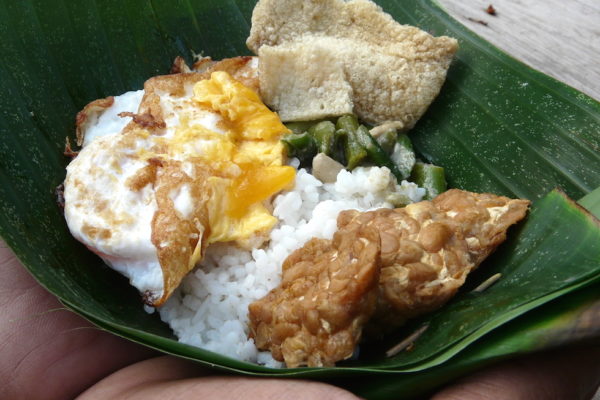A noisy junction at the mid of the day in an Indonesian metropolis: Crowds of cars and motorbikes pass by leaving dark grey clouds in the streets that combine with the dust. It is hot and noisy and dirty. Suddenly, amid this noisy traffic crowd a clean, white bus of the State Electricity Company (PLN) rides past. On it´s shining surface a colorful label states “No suap” (no bribe), boosted by a big exclamation mark.
As I saw this in front of my car window, my first thought was, “Hey great! PLN seems to have implemented anti-corruption measures and is stating in public that they can´t be bribed.” I smiled and felt satisfied about the obvious development progress of Indonesia, as a critical voice came up inside my ear. “Hm, why do they do so? Is it necessary to point that out maybe because corruption is the way things normally go?”
Indonesia´s fight against corruption
A look at the Corruption Index of Transparency International tells that perhaps my critical voice wasn´t so wrong. Currently, Indonesia ranks 90, which means the bottom part of the mid field. Although it´s rank has moved up during the past years, this result is still not satisfying regarding the fact that the government runs an Anti Corruption Commission (KPK) since almost 13 years.
The recent history of KPK itself, however, gives testimony about how difficult it is to fight against corruption in Indonesia. Having been successful with catching corruptors red-handed in an action-movie like (and very media-effective) manner during it´s first years, it also has to deal regularly with serious attacks from instances that have moved into KPK´s spotlight.
“It´s because of the culture.”
But why is the country struggling so much in it´s aim to eventually overcome corruption? Two main reasons have been repeatedly explained by Indonesian friends to me: First, the old structures of the Soeharto regime still exist in that those who gained access to funds used this chance to enrich themselves. Which might definitely be true, if you witness the recent KPK cases.
Second: It´s because of the culture. This doesn´t mean that Indonesian cultures suggest people to become corrupt. However, there are some cultural values that make it difficult to distinguish between corruption and – let´s say – relationship management.
Making a gift is rather an expression of mutual commitment and loyalty than an attempt at bribery.
Indonesian cultures, no matter if in Sumatra, Java or Irian Jaya, consider having a good relationship to others as something most important in everyday life. People invest time and money to care for the people around because they feel responsible.
In the business world relationships are often built up, maintained and stabilized through the tradition of gift making. This is rather an expression of mutual commitment and loyalty than an attempt at bribery. For Indonesians it is the most normal thing on earth, for example, to send out gifts to business partners at the big religious holidays Lebaran or Christmas. Expat business people are often puzzled when a parcel service with a big, colorfully wrapped present knocks at the office door to deliver Season´s Greetings from an Indonesian business partner. The other way around, bringing souvenirs from expat home countries is considered a clear sign of appreciation and commitment among Indonesian business managers.
The “golden rule”: If gifts are used to circumvent the law, then we talk clearly about corruption.
Making a gift is a tradition and not considered corruption. This means, as long as the gift size suits to the size of the business and the relationship. If the size of the gift (a brand new Porsche) does not stand in relation to the business deal, the gift could easily cause face loss at the receiver´s side. Reputable businessmen would even feel offended by an oversized gift.
For foreigners it is often hard to figure out where gift making ends and bribery starts. Indeed there is a thin line in between that makes it difficult to distinguish. Especially business people from European countries that have been socialized in (company) cultures where jobs and deals are strictly separated from the relationships to the involved people often feel insecure when dealing with this topic. Understandably, because they have not only signed but also internalized their company´s code of conduct that explicitly prohibits any acceptance or presentation of gifts and money.
But how to define this thin line around the question of “Gift or bribe?” The “golden rule” that I refer to is: If gifts or money are used to in whatever way circumvent the law, then we don´t talk about relationship management anymore but clearly about corruption.
Change of traditions?
Big Indonesian state companies even want to get rid of these customs of gift making and “appreciation money”. Not only that PLN makes a public statement that cruises around Indonesia daily. Also the telecommunication company TELKOM asks customers to not give any money or gifts to the technician that sets up the line at home.
Sure, these are praiseworthy efforts. If they will have an impact to the tradition is yet questionable. Our kindhearted neighbor has had a hard time with the TELKOM technician that does not want to receive any tips nor gift. Our neighbor finally buys him snacks and makes coffee – just to fulfill her inner need to appreciate somebody who helps her.
Back to the question, if admitting corruption is the way things normally go. After having analyzed traditions, I´d say no. However, first of all we have to define what corruption or bribery means. And this can differ a lot from culture to culture.
Do you like what you are reading? Then, please like this post and share it to friends that might be interested in this topic. Thank you!





 Just
Just